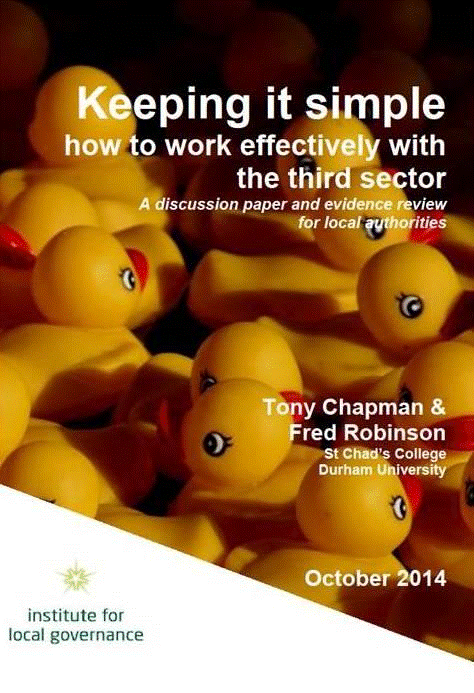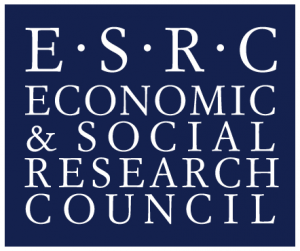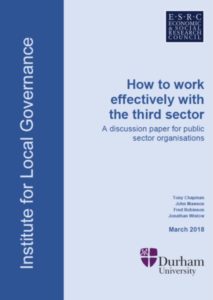 In recent decades financial pressures on local authorities (LAs) has resulted in significant changes in the ways their services are provided through, for example, contracting out services, co-production, asset transfer, volunteering and establishing new types of organisation (such as social enterprises and mutuals).
In recent decades financial pressures on local authorities (LAs) has resulted in significant changes in the ways their services are provided through, for example, contracting out services, co-production, asset transfer, volunteering and establishing new types of organisation (such as social enterprises and mutuals).
Such developments have presented internal and external organisational, cultural and operational challenges for LAs when forging new relationships between commissioner, producer, and customer/citizen. Building on evidence-based hypotheses from previous academic and action research, this project will help LAs produce new solutions to increase the impact of social policy interventions.
The new two-year project, beginning in September 2015, will work with six local authorities in North East England to do this work, including: Darlington Borough Council, Durham County Council, Gateshead Council,, Northumberland County Council, Stockton-on-Tees Borough Council and Sunderland City Council.
The project, jointly funded by the ESRC and Institute for Local Governance will be undertaken by Professors John Mawson (ILG), Tony Chapman and Fred Robinson of St Chad’s College, Durham University. The aim of the proposed programme of work is to assist LAs in navigating change in a complex political, social and economic environment which may demand fundamental change in the way that service delivery is conceptualised and effected.
To do this, LAs need to consider and embed new ‘ways of thinking’ about their working relationships with external organisations. Their ultimate purpose is to reduce the costs and improve the quality of services through new approaches to delivery whilst at the same time engaging more directly community organisations and citizens in the process.
The work will address six areas of policy and service delivery where impact can be achieved by 2019:
1 Outsourcing of local authority services:
Considering different approaches to outsourcing including the establishment of LA wholly owned companies/social enterprises built from former in-house providers, to Third Sector/Private Sector consortia/partnerships, etc. Determining what factors contribute to good decision making on outsourcing – such as knowledge/evidence of good practice/economical delivery in-house or by external organisations. Exploring the factors which make outsourcing possible or not: involving exploration of issues surrounding LA organisational culture/history, configuration of local parties in the council, political climate, attitudes and beliefs of Members, etc.
2 Growing the ‘civic core’ through volunteering
Role and efficacy of current grant funding regimes and LA support for local community organisations. Assessment of the extent of volunteering in the area and recognition of most effective routes to volunteering via the LA, TSOs, faith groups etc. Raising awareness of the strengths and weaknesses of volunteer contribution, knowing where unmet demand currently exists and how to increase supply of volunteers, awareness of how to assess/understand the value of volunteering for the local area. Leverage LA has to contribute towards the civic core through employee supported volunteering schemes, pre-retirement planning, skills-share programmes, etc.
3 Partnership working and co-production
Assessment of LA’s willingness and potential to work as a ‘lead partner’, ‘consortia partner’ or ‘support partner’ in social interventions funded via external sources, shared resources or a mix of shared and external resources. Recognising the scope for and identifying practicable approaches to alternative service delivery models delivered in conjunction with other public sector organisations (particularly health, police and fire services) and Third Sector/Private Sector organisations. Approaches to investment in partnership building and the encouragement of partnership potential amongst TSOs in advance of potential initiatives.
4 Assessing the impact of interventions involving TSOs
Exercising effective judgement decisions on where impact measurement assessment should be employed. Producing transparent and achievable objectives for interventions which are realistically matched with levels of resource invested to achieve them. Knowing when requirements for impact assessment may or may not be achievable and the appropriate technical measures, recognising the need for innovative practice, knowing when calls for interventions to become sustainable are not realistic. Adopting principals and measures which allow for good judgements to be made on the social value of less measurable small-scale interventions.
5 Hearing the ‘voices’ of the Third Sector in the commissioning cycle:
Establishing/maintaining governance protocols and structures to ensure Third Sector representation. Structured engagement and involvement of Third Sector in identifying and setting local and strategic priorities via, for example: area committees, for a representing communities of interest, councils of interest, strategic planning groups (such as an LSP), etc. How to ensure that TSOs can contribute effectively to the design of innovative solutions in service delivery – and especially so when funded through a range of LA or non-LA sources.
6 Strengthening the confidence, capacity and capability of the Third Sector
Maintaining good intelligence on sector structure, dynamics and strengths upon which realistic decisions about investment can be made. Building LA understanding on the limits of Third Sector engagement/compliance with political/procedural preferences to allay expectations of ‘incorporating’ Third Sector organisations into LA policy and practice. Assessing the scope for and benefits to be accrued from investment in Third Sector capability and capacity to contribute to LA initiatives and understanding the limits of such investment. How effectively to communicate LA agreed priorities to the Third Sector, and devising mechanisms for signposting TSOs to other sources of funding and support in areas where the LA cannot/does not want to invest.
The Keeping it Simple report is available to download, together with a summary report – published October 2014:
KEEPING IT SIMPLE How to work effectively with the third sector (October 2014)
Keeping it Simple (Summary Report) October 2014
The final report from this study, and its sister project, Sharing the Responsibility, can be downloaded here: ILG How to work effectively with the third sector discussion paper March 2019
